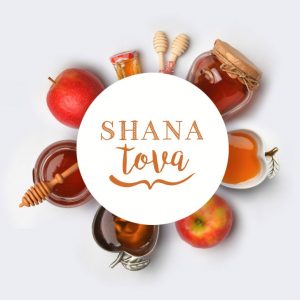We don’t say “Happy New Year” on Rosh HaShanah, the Jewish New Year. Well, some people do, but the traditional greetings translate to “Have a Good and Sweet Year,” “To a Good Year,” or “A Good Holiday.” Yes, many people understand “good” to mean “happy,” but even when we mean that our mindset is more about health and fulfillment than joy. The Jewish New Year is not about joy, it is about what is good.

I led services in a tent in the rain on the second day of Rosh HaShanah with a small group of families in person and another couple of families on Zoom. It was an inauspicious start to the year. As we went through the liturgy, I pointed out how we are asked to do our part to crown God as Creator and to do good in the world so God’s goodness can be found in it. I particularly mentioned a section of the musaf (additional) service that focuses on remembrances, including remembering the covenant between God and Noah, symbolized by the rainbow. Sure enough, as we finished services, the rain stopped, the sun came out, and I suggested we look for rainbows.
That service was neither sad nor disappointing. Quite the contrary, that service was good. Families whose children cannot yet be vaccinated for COVID-19 were able to gather in person, a big contrast to last year. Where Zoom had been the default last year, this time, families chose to use it to be together given the weather, and together, we marked the Jewish New Year. We prayed the liturgy, we enacted the messages of the tradition, and we explored what this year might mean. We did good.
Part of why we don’t say “Happy New Year” is that Rosh HaShanah was once the Day of Judgment (with Yom Kippur as the Day of Atonement, the moment to avert the judgment). Jews begin the year, yes, with celebration and sweetness, but also with seriousness. Rosh HaShanah asks us to hear the call of the shofar (the ram’s horn) that announces God as Sovereign and Judge. We must set things right with our fellow humans so that we can come to Yom Kippur to set the rest right with God.
That reset, known as teshuva (often translated as repentance, but more literally “turning”), drives home the idea that the new year will be good if we make it good. Rosh HaShanah is not an out-with-old-in-with-the-new party; it is a beginning and a re-beginning of creative action. We hope it turns out with much happiness (a fact we celebrate on the holiday of Sukkot), and we start towards that possibility by focusing on doing good.
The Shabbat in between Rosh HaShanah and Yom Kippur is referred to as Shabbat Shuvah (the Sabbath of Turning). This year, Shabbat Shuvah coincides with the 20th anniversary of the 9/11 attacks on the United States. Normally, Shabbat is a cessation of work. This Shabbat Shuvah, I will dedicate the work of my “turning,” my repentance, repair, and resetting, to the memory of all we lost that day, the innocent souls and so much more. I invite you, whether you are Jewish or not, to help start the Jewish year by doing something good for someone else. That’s what we did in New York City that day and the days after, I was there. Let’s make this year a good year; maybe it will even be a happy one.
About Rabbi Jeremy Winaker
Rabbi Jeremy Winaker is the executive director of the Greater Philadelphia Hillel Network, responsible for West Chester University, Haverford, Bryn Mawr, and other area colleges. He is the former head of school at the Albert Einstein Academy in Wilmington and was the senior Jewish educator at the Kristol Hillel Center at the University of Delaware for four years. Rabbi Winaker lives in Delaware with his wife and three children.

Comments